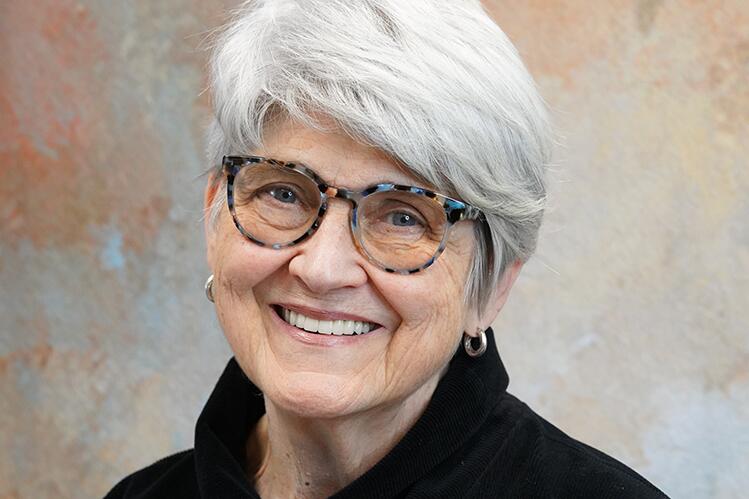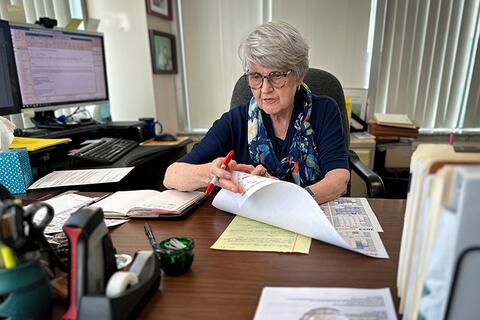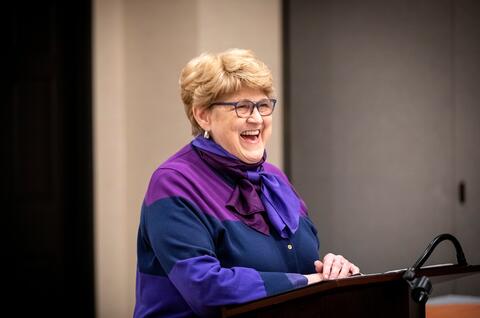ABE alum Kay Whitlock makes waves in ag engineering and society

Kay Whitlock is a 2023 recipient of the Distinguished Alumni Award from the Department of Agricultural and Biological Engineering, part of the College of Agricultural, Consumer and Environmental Sciences and The Grainger College of Engineering.
College-bound with an aptitude for math and science, Kay Whitlock’s guidance counselor presented her with three career options: math teacher, physics teacher, or nurse.
She suspected she did not have the patience for these options when she headed to a newly established community college, now called Southeastern Illinois College. Luckily, her math instructor, Jewel Anthony, spotted Whitlock’s potential and diverted her into a pre-engineering program that guaranteed admission to the University of Illinois.
For Whitlock, who grew up on a small family farm in Saline County, the ag engineering program felt like home.
“I do know that degree from [The Grainger] College of Engineering made a huge difference in my career, and I'm always proud to be an alum,” Whitlock said. “I also know, pretty certainly, that I probably wouldn't have made it if it hadn't been for the ag engineering department. From the moment I walked in the door, and to this day, ABE has always been welcoming and supportive of me, and proud of me, and made it very clear that I was important and respected. I have had such a happy home in ag engineering.”
She graduated and became a hydraulic engineer for the State of Illinois, working on flood control and navigation in the wake of the National Environmental Policy Act in 1970 and the revised Clean Water Act in 1972.
“Over my career, I've just seen phenomenally enormous changes in how we treat our water, how we care for our water, and how we manage it,” said Whitlock. “The world of water has changed so much over the years. It's a fascinating pathway for me to see that, and I can't always believe how much fun it's been. It's just been amazing, and it still is — I can't imagine a person ever being happier in their profession.”

She has also seen the engineering piece of her profession evolve. In 1970, she conducted painstaking manual calculations to show how a flood flowed through a structure by moving a long strip of graph paper, multiplying this number by this number by this number, maybe 30 long, and then shifting it one square over and doing it all again.
“It was mind-numbing work,” she said. “When I was doing it manually, it may have taken three or four months to do a calculation. Then the Corps of Engineers and Soil Conservation Service developed programs to do hydraulic modeling in about a week, and now, the young engineers in my office can input the data and tell me in an afternoon, ‘Does this work?’”
Recently, her team completed a hydraulic analysis to determine that a new culvert at Chicago O'Hare International Airport would comply with regulations within a single day.
Whitlock worked for the State of Illinois for 18 years on a “wonderful variety” of work related to water resources, including sediment erosion protection, flood control, navigation and river management, and levees.
Along the way, she became a licensed engineer and earned an “accidental” Master’s degree from Sangamon State University, now the University of Illinois Springfield, by pursuing graduate coursework that interested her and would help her understand the human implications, and also the power, associated with her career.
In 1986 and 1987, DuPage County experienced monumental floods that spurred legislation for flood control. Whitlock weighed in and ensured that the program — still active to this day — would create an effective stormwater system, protect wetlands, and include a strong sediment erosion protection component.
Whitlock was the first chief stormwater engineer in DuPage County, and three years later, she had the opportunity to run the flood control program in Silicon Valley as the assistant general manager and flood control manager at the Santa Clara Valley Water District. After a decade in the role, she helped pass a $325 million referendum to fund the program for 15 years, which she calls her going-away present.
While working in California, Whitlock became interested in solving homelessness, a mission she brought with her when she returned to Chicago in 2001. Since then, she has remained actively involved in the largest non-profit provider of service-enriched housing in the Great Lakes region, Mercy Housing Lakefront. Her husband, John Leicht, wholeheartedly supports her volunteer efforts, loading up the car with deliveries and carrying donated items when they’re in “delivery mode.”
“My goal is to end homelessness in my lifetime,” Whitlock said. “The philosophy is, and this is what I learned in California, if you're homeless, there's a reason you fell off the edge. Maybe you don't have job skills, maybe you have a health problem, maybe you've lost your health care. Mercy Housing Lakefront works on the root cause through a social worker to help you work through your problem.”

Her other good works include co-chairing the external advisory board of the Prairie Research Institute (PRI), which encompasses Illinois’ State Scientific Surveys, along with the Vice Chancellor for Research & Innovation Susan Martinis. Just this year, with the encouragement of PRI executive director Praveen Kumar, she created a mentorship program for mid-career PRI scientists and staff covering topics such as “collaborative, interest-based decision making.”
“I feel like I get more from them than they could possibly be getting from me because they're so smart, and I love to be around smart people,” she said. “I have such a reverence for the people who do pure science, and I revere the data. PRI is really important to me, and I am really proud to be here.”
Today, she is vice president of Christopher B. Burke Engineering, Ltd.
Whitlock said to receive the ABE Alumni Award is “overwhelming” and recognizes that she is symbolically important. She considers it her duty to help open doors for others with diverse backgrounds “and help them see the light through there.”
“I've really developed a much better understanding of the value of representation,” she said. “ All of those years that I was doing this, I was just working. I was doing the work that was before me and finding so much reward in that work that I actually never got outside of myself, and thought about what that might mean to the people who were seeing me do that.”
To this day, Whitlock tries to recruit students to ABE. “When I meet young people, college students starting out, I always say to them and their parents, my wish for you is that you find the thing that brings you the joy and success and happiness that engineering has brought to me,” she said. “And then I try to talk all of them into being ag engineers because I was so supported by that department.”